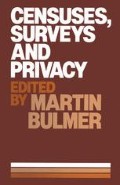Abstract
The opening chapters have considered general issues concerning privacy and quantitative social research. The core of the book will now examine two specific types of social research — social surveys and population censuses. Privacy in social research poses problems which cannot be resolved in the abstract. They need to be considered in the context of particular types of data and specific methods of social research. This section considers social survey research.
Preview
Unable to display preview. Download preview PDF.
Notes and References
M. Useem and G. T. Marx, ‘Ethical dilemmas and political considerations in social research’, in R. B. Smith (ed.), A Handbook of Social Science Methods: Qualitative Methods, New York, Irvington Press, 1978.
Cf. M. Abrams, Social Surveys and Social Action, London, Heinemann, 1951;
Pauline V. Young, Scientific Social Surveys and Research, Englewood Cliffs, Prentice-Hall, 1939.
Cf. M. C. Kendall, ‘Measurement in the study of society’, in W. Robson (ed.), Man and the Social Sciences, London, Allen and Unwin, 1972, pp. 141–3.
F. Teer and J. D. Spence, Political Opinion Polls, London, Hutchinson, 1973, Chapter 1.
Descriptions of the technical operations involved in a social survey are available in a number of standard works: for example, C. A. Moser and G. Kalton, Survey Methods in Social Investigation, London, Heinemann, 1971;
E. R. Babbie, Survey Research Methods, Belmont, California, Wadsworth, 1973;
G. Hoinville et al., Survey Research Practice, London, Heinemann, 1978.
E. Josephson, ‘Notes on the sociology of privacy’, Humanitas, XI, February 1975, p. 21.
H. Ware and J. C. Caldwell, ‘Confidentiality, Privacy and Sensitivity in Household Surveys’, Australian Journal of Statistics, 14, 1972, pp. 197–203.
Sir Claus Moser, ‘The role of the Central Statistical Office in Assisting Public Policy Makers’, The American Statistician, 30, May 1976, p. 66.
D. I. Warren, ‘Some Observations from post-riot Detroit: the role of the social researcher in contemporary racial conflict’, Phylon, 34, June 1973, pp. 171–86 at p. 173.
H. C. Kelman, ‘Privacy and Research with Human Beings’, Journal of Social Issues, 33, 1977, pp. 169–195, esp. pp. 173–6.
See also D. Montero, ‘Research among racial and cultural minorities’, Journal of Social Issues, 33, 1977, pp. 1–10.
A. B. Atkinson and A. J. Harrison, The Distribution of Personal Wealth in Britain, Cambridge University Press, 1978; Appendix 1, Sample Survey Evidence, pp. 268–75.
E. Singer, ‘Informed Consent: consequences for response rate and response quality in social surveys’, American Sociological Review, 43, 1978, pp. 144–62.
Editor information
Editors and Affiliations
Copyright information
© 1979 Macmillan Publishers Limited
About this chapter
Cite this chapter
Bulmer, M. (1979). Introduction. In: Bulmer, M. (eds) Censuses, Surveys and Privacy. Palgrave, London. https://doi.org/10.1007/978-1-349-16184-3_4
Download citation
DOI: https://doi.org/10.1007/978-1-349-16184-3_4
Publisher Name: Palgrave, London
Print ISBN: 978-0-333-26223-8
Online ISBN: 978-1-349-16184-3
eBook Packages: Palgrave Social & Cultural Studies CollectionSocial Sciences (R0)

